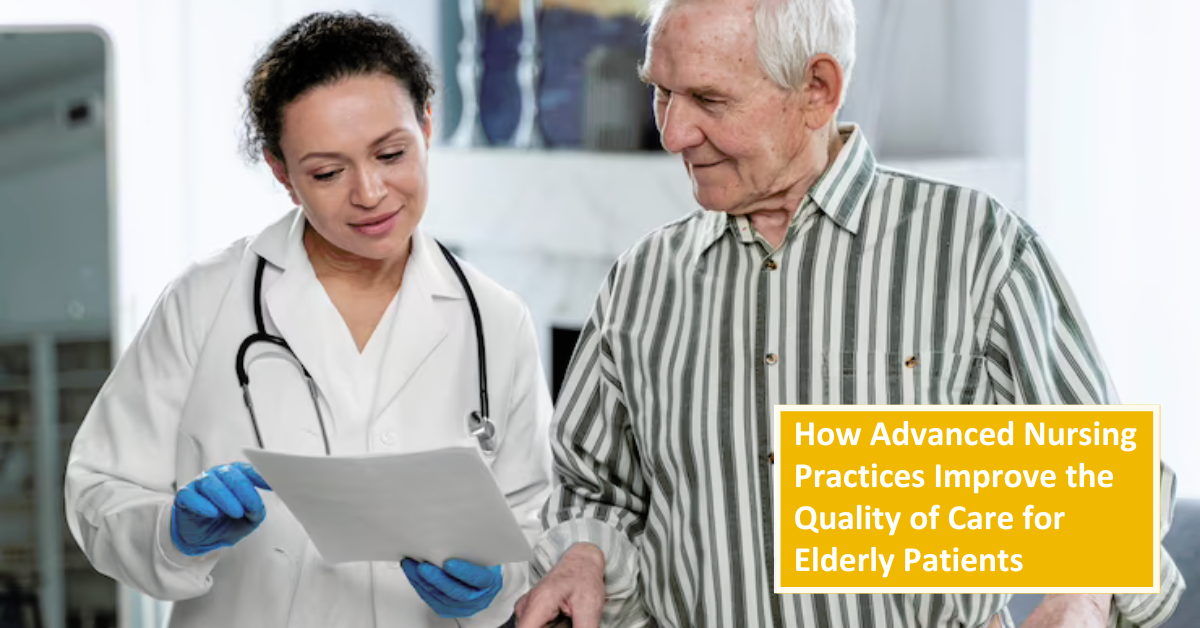
-
Posted on 18th July, 2023
How Advanced Nursing Practices Improve the Quality of Care for Elderly Patients
As the world populace continues to age, delivering high-quality care to elderly patients has become ever more important. Advanced nursing practices perform an important part in improving the healthcare outcomes and overall well-being of the elderly. Nurses with advanced training contribute significantly to enhancing the quality of care for elderly patients with their specialised skills, knowledge, and compassionate approach.
In this blog, we will explore how advanced nursing practices impacts the lives of older adults positively and emphasise the key areas where these practices make the difference.
Individualised care and comprehensive assessments
Comprehensive assessments and individualised care plans are one of the fundamental ways through which advanced nursing practices benefit elderly patients. Advanced practice nurses (APNs) possess special skills and knowledge to perform thorough assessments. They take care of the mental, emotional, and social well-being aspects of the patient and not only their physical health. The unique needs and challenges faced by each older adults are identified by this holistic approach. In this way it enables the development of personalised care plans customised to their individual requirements.Improved expertise in geriatrics
Nurses with advanced training in geriatrics have a thorough understanding of the process of ageing and unique health conditions that commonly affect older adults. They effectively manage chronic diseases, such as diabetes, hypertension, and arthritis which are prevalent among the elderly population with the help of this expertise. Ensuring the safe and appropriate use of medications and minimising adverse drug reactions, APNs are well-versed in geriatric pharmacology. They can make informed decisions that optimise health outcomes for elderly patients by leveraging their advanced knowledge.
Preventive care and chronic disease management
The important aspect of caring for elderly patients includes managing chronic diseases. Advanced nursing practices enable nurses to take a pre-emptive approach to preventive care and chronic disease management. By educating patients about their conditions, providing guidance on medication adherence and promoting healthy lifestyle modifications, APNs consistently work closely with the patients. Advanced practice nurses contribute to minimising disease complications, hospitalisations, and overall healthcare costs for older adults by focusing on prevention, early detection and timely intervention.
chronic disease management
Interdisciplinary Collaboration and Coordination of Care
Older patients frequently need care from multiple specialists and healthcare providers. Advanced nursing practices accentuate interdisciplinary collaboration and the coordination of care. Acting as a point of contact, APNs ensure seamless communication and collaboration between various healthcare professionals who are involved in the care of the elderly patients. Advanced practice nurses foster effective teamwork by facilitating comprehensive, person-centred care which focuses on the physical, emotional and social aspects of aging.
Strong support and advocacy
Nurses who possess advanced training are also strong advocates for their patients apart from being skilled clinicians. APNs often serve as their voice, ensuring their rights and preferences are respected when caring for elderly patients. Advanced practice nurses promote for proper resources, services, and policies that benefits the older population. APNs offer emotional support to elderly patients and their families. They help in promoting a sense of empowerment and well-being.
Conclusion
Advanced nursing practices play a very important part in developing the quality of care for elderly patients. They perform various functions through interdisciplinary collaboration, advocacy and support in addition to comprehensive assessments and enhanced geriatric expertise. They also manage individualised care plans, chronic disease management, preventive care and coordination of care. IHM’s Gerontology nursing certificate online imparts advanced skills and knowledge that can significantly enhance the overall well-being and healthcare outcomes of older adults. Contact IHM for more details.
FAQ’s

